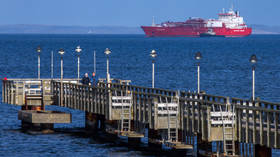A spokesperson has acknowledged that the sanctioned country’s energy is still flowing into the bloc
Russian energy continues to flow to the EU despite the bloc’s commitment to eliminating its dependence on it, a European Commission spokesperson has said.
The EU’s imports of liquefied natural gas (LNG) from Russia surged in the first two weeks of 2025, rising by more than 10% in annual terms.
“Russian energy – particularly gas – is still present in the EU,” the EC spokesperson for climate action and energy, Anna-Kaisa Itkonen, told a press briefing on Monday.
She noted that the Commission plans to issue a roadmap in late February or mid-March aimed at completely ending Russian energy imports.
Last week, Politico reported, citing data tracked by commodities data provider Kpler, that imports by EU member states of Russian LNG have surged to an all-time high after they purchased 837,300 metric tons of the super-chilled gas in the first 15 days of this year.
Itkonen had also previously admitted that the EU’s Russian gas imports, particularly of LNG, increased in 2024.
Imports surged again shortly after Ukraine refused to extend a five-year transit contract with Russian energy giant Gazprom at the end of 2024, cutting off Romania, Poland, Hungary, Slovakia, Austria, Italy, and Moldova from piped natural gas from Russia.
Following the escalation of the Ukraine conflict in 2022 and the sabotage of the Nord Stream pipelines, the EU prioritized reducing its reliance on Russian energy. Some members voluntarily stopped importing Russian gas, while others kept doing so. Some countries also continued importing Russian LNG since the chilled fuel was only partially targeted by sanctions.
In June, the EU targeted Russian LNG for the first time, banning re-loading operations, ship-to-ship transfers, and ship-to-shore transfers with the purpose of re-exporting to third countries via the EU. The sanctions have a nine-month transition period.
According to data compiled by the Institute of Energy Economics and Financial Analysis, in the first half of 2024 Russia was the second-biggest supplier of LNG to the European continent after the US.
The loss of Russian gas could cost the EU over €1 trillion, according to Kirill Dmitriev, chief executive of the Russian Direct Investment Fund.

 2 hours ago
3
2 hours ago
3








